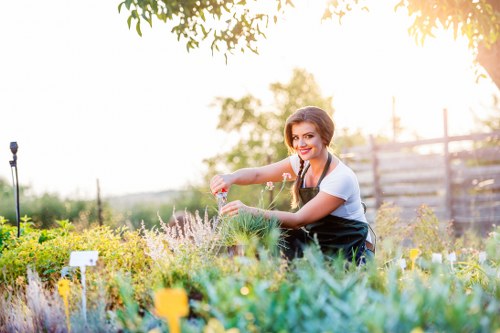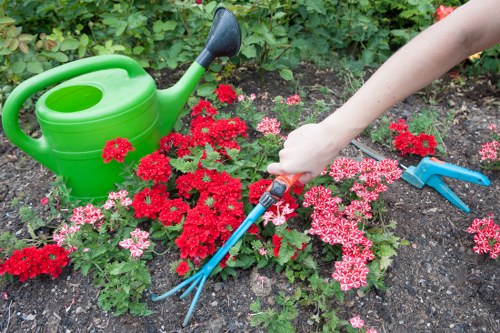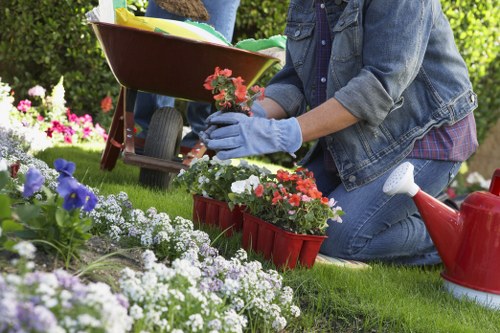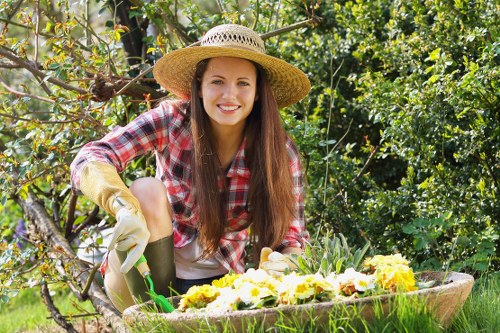Landscape Gardening in Islington

Islington, a vibrant borough in London, offers a unique blend of urban charm and green spaces. Landscape gardening in Islington is not just about enhancing the aesthetic appeal of your property; it's about creating a sustainable and enjoyable outdoor environment that complements the bustling city life.
Whether you have a spacious garden or a compact terrace, landscape gardening can transform your outdoor area into a serene retreat. With the right planning and professional guidance, you can achieve a harmonious balance between nature and urban living.
In this comprehensive guide, we'll explore the key aspects of landscape gardening in Islington, including design principles, plant selection, sustainable practices, and the benefits of hiring local gardening experts.

Understanding Landscape Gardening
Landscape gardening encompasses the art and science of designing outdoor spaces to enhance their beauty and functionality. It involves a combination of horticulture, architectural design, and environmental considerations to create spaces that are both visually appealing and ecologically sustainable.
In Islington, where space can be limited, effective landscape gardening requires innovative solutions tailored to the specific needs and constraints of the area. From rooftop gardens to community green spaces, the possibilities are endless.
At its core, landscape gardening focuses on:
- Enhancing the aesthetic appeal of outdoor spaces
- Improving environmental sustainability
- Increasing property value
- Creating functional areas for leisure and relaxation

Design Principles for Islington Gardens
Successful landscape gardening begins with thoughtful design. Here are some essential design principles to consider:
- Balance and Harmony: Ensure that all elements in the garden complement each other, creating a cohesive look.
- Scale and Proportion: Choose plants and structures that are proportionate to the size of your garden.
- Focal Points: Incorporate features like sculptures, fountains, or unique plants to draw attention and guide the eye.
- Texture and Color: Use a variety of textures and colors to add depth and interest to your garden.
- Functionality: Design spaces that serve specific purposes, such as dining areas, play zones, or relaxation spots.

Choosing the Right Plants
Plant selection is crucial in landscape gardening. In Islington, it's important to choose plants that thrive in the local climate and conditions. Consider the following when selecting plants:
- Climate Compatibility: Opt for plants that are well-suited to Islington’s temperate climate.
- Soil Type: Test your soil to determine its pH and nutrient levels, and select plants accordingly.
- Maintenance Requirements: Choose plants that match your available time and gardening expertise.
- Seasonal Interest: Incorporate plants that offer visual interest throughout the year.
- Native Species: Native plants are often more resilient and better for the local ecosystem.

Sustainable Gardening Practices
Sustainability is a key trend in modern landscape gardening. Implementing sustainable practices not only benefits the environment but also ensures that your garden remains healthy and vibrant for years to come.
Here are some sustainable gardening practices to consider:
- Rainwater Harvesting: Collecting rainwater reduces dependency on municipal water supplies and helps conserve water.
- Composting: Composting organic waste enriches the soil and reduces landfill contribution.
- Native Planting: As mentioned earlier, native plants require fewer resources and support local wildlife.
- Organic Gardening: Avoid chemical pesticides and fertilizers to maintain a healthy ecosystem.
- Energy-Efficient Lighting: Use solar-powered or LED lighting to reduce energy consumption.

Maximizing Small Spaces
Living in Islington often means dealing with limited outdoor space. However, with creative design strategies, even the smallest areas can be transformed into beautiful gardens.
Consider these tips for maximizing small garden spaces:
- Vertical Gardening: Utilize walls and fences for vertical plant arrangements.
- Multi-Functional Furniture: Choose furniture that serves multiple purposes, such as storage benches.
- Mirrors and Reflective Surfaces: These can create the illusion of more space.
- Compact Plant Varieties: Select dwarf or compact plant species that fit smaller areas.
- Strategic Lighting: Proper lighting can enhance the perception of space and highlight key features.

Hiring Professional Gardeners in Islington
While DIY gardening can be rewarding, hiring professional landscapers in Islington offers numerous advantages. Professionals bring expertise, experience, and a keen eye for detail that can elevate your garden design.
Benefits of hiring local gardening experts include:
- Customized Design Solutions: Professionals tailor designs to your specific needs and preferences.
- Quality Plant Selection: Local gardeners know which plants thrive in Islington’s climate.
- Efficient Project Management: From planning to execution, professionals ensure timely and efficient completion of projects.
- Maintenance Services: Ongoing maintenance keeps your garden healthy and beautiful.
- Access to Resources: Professionals have access to a wider range of materials and tools.

Benefits of Landscape Gardening
Engaging in landscape gardening offers numerous benefits beyond aesthetic appeal. It contributes to the overall well-being of residents and the community.
Environmental Benefits
Landscape gardening plays a significant role in enhancing the environment. Key benefits include:
- Air Quality Improvement: Plants absorb carbon dioxide and release oxygen, purifying the air.
- Urban Cooling: Green spaces help mitigate the urban heat island effect.
- Wildlife Habitat: Gardens provide habitats for various species, promoting biodiversity.
- Soil Erosion Prevention: Plant roots stabilize the soil, preventing erosion.
- Water Management: Gardens can aid in rainwater absorption and reduce runoff.

Economic Advantages
Investing in landscape gardening can also have positive financial implications:
- Increased Property Value: A well-designed garden enhances the market value of your property.
- Energy Savings: Strategically placed trees and shrubs can provide natural insulation, reducing heating and cooling costs.
- Attractiveness for Tenants: For rental properties, gardens can attract and retain tenants.
- Long-Term Savings: Sustainable gardening practices reduce long-term maintenance and resource costs.

Personal Well-Being
A beautiful garden offers a personal sanctuary where you can relax, unwind, and connect with nature. The act of gardening itself is therapeutic, reducing stress and promoting mental health.
Key personal benefits include:
- Stress Reduction: Spending time in nature has been shown to lower stress levels.
- Physical Activity: Gardening involves physical tasks that promote fitness.
- Creativity and Expression: Designing and tending a garden allows for creative expression.
- Social Interaction: Community gardens foster social connections and a sense of community.
- Mindfulness: Being present in the garden encourages mindfulness and mental clarity.

Seasonal Gardening in Islington
Each season offers unique opportunities and challenges for landscape gardening. Understanding seasonal changes helps in planning and maintaining a thriving garden year-round.
Spring
Spring is a time of renewal, making it ideal for planting new flowers and shrubs. Focus on:
- Planting perennials and annuals
- Pruning deciduous trees and shrubs
- Preparing soil by adding compost and fertilizers
- Installing garden structures like trellises and arbors
Summer
Summer gardening involves maintaining plants and ensuring they thrive in the warmer weather:
- Regular watering and mulching
- Deadheading spent flowers to encourage new blooms
- Controlling pests and diseases organically
- Harvesting vegetables and herbs

Autumn
Autumn is crucial for preparing your garden for the colder months:
- Raking fallen leaves and debris
- Planting bulb flowers for spring
- Pruning trees before winter
- Protecting vulnerable plants from frost
Winter
Winter gardening focuses on protecting and planning:
- Mulching to insulate plant roots
- Covering plants with frost cloths
- Planning next year’s garden layout
- Maintaining garden tools and equipment

Community Gardens in Islington
Community gardens are a growing trend in urban areas like Islington. They offer residents the opportunity to engage in gardening, foster community spirit, and contribute to local green initiatives.
Benefits of Community Gardens
- Social Interaction: Gardens provide a space for people to connect and collaborate.
- Local Food Production: Growing vegetables and herbs promotes healthy eating and food security.
- Environmental Education: Gardens serve as educational sites for sustainable practices.
- Beautification: Community gardens enhance the visual appeal of neighborhoods.
- Mental Health: Engaging in gardening activities promotes well-being.
Starting a Community Garden
If you're interested in starting a community garden in Islington, consider the following steps:
- Identify a suitable location with adequate sunlight and access to water.
- Gather interested community members and form a planning committee.
- Seek permissions from local authorities or property owners.
- Design the garden layout, including planting areas and communal spaces.
- Organize regular maintenance schedules and volunteer groups.

Integrating Technology in Landscape Gardening
Modern technology offers innovative solutions to enhance landscape gardening. Integrating technology can improve efficiency, sustainability, and overall garden management.
Smart Irrigation Systems
Smart irrigation systems use sensors and automated controls to optimize watering schedules based on weather conditions and soil moisture levels. Benefits include:
- Water conservation
- Reduced water bills
- Improved plant health
Garden Planning Software
Using garden planning software helps you design layouts, track plant growth, and manage garden tasks efficiently. Features typically include:
- Visual garden mapping
- Plant databases
- Task scheduling and reminders
- Data analytics for garden performance
LED Lighting
LED lighting enhances garden aesthetics while being energy-efficient. It allows for:
- Highlighting key garden features
- Creating ambiance for evening gatherings
- Improving security around the property

Maintenance Tips for a Thriving Garden
Proper maintenance is essential to keep your garden healthy and beautiful. Here are some tips to ensure your landscape garden in Islington thrives:
- Regular Watering: Ensure plants receive adequate water, especially during dry spells.
- Pruning and Trimming: Remove dead or overgrown branches to promote healthy growth.
- Weeding: Keep your garden free from unwanted weeds that compete for nutrients.
- Soil Health: Test and amend the soil regularly to maintain optimal fertility.
- Pest Control: Use natural or organic methods to manage pests without harming beneficial insects.

Final Thoughts on Landscape Gardening in Islington
Landscape gardening in Islington offers a myriad of benefits, from enhancing property value to promoting environmental sustainability. By embracing thoughtful design, selecting appropriate plants, and implementing sustainable practices, you can create a garden that not only beautifies your space but also contributes positively to the community and the environment.
Whether you’re a seasoned gardener or just starting, the vibrant spirit of Islington provides endless inspiration for your landscape projects. Don’t hesitate to seek professional assistance to bring your garden vision to life.
Contact us today to begin your landscape gardening journey in Islington and transform your outdoor space into a stunning haven.

